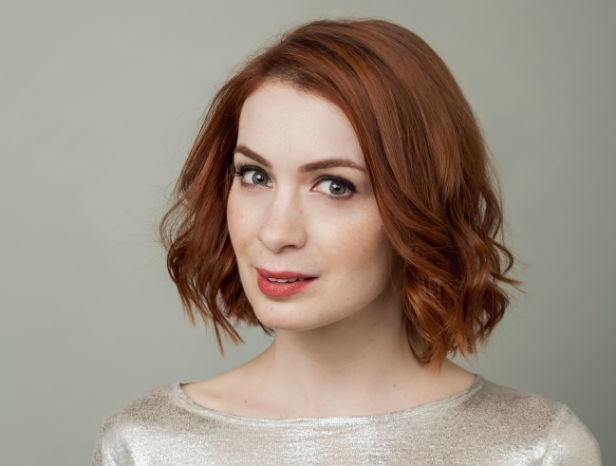
You probably know Felicia Day from her awesome web series The Guild. Or from her awesome web site Geek & Sundry. Or from her appearances on awesome shows like Buffy The Vampire Slayer (where she played potential slayer Vi), Supernatural (where she played excellent nerd Charlie Bradbury) or Dr Horrible’s Sing-Along Blog (where she played Penny).
Now, Day has written a book, You’re Never Weird On The Internet (Almost), in which she chronicles her journey from home schooled kid to internet sensation. Along the way she talks about her first experiences of online gaming, her first Hollywood auditions, creating The Guild, and the importance of connecting with fans. It’s funny, honest, warm and encouraging.
Day took the time to talk to us about her reasons for writing the book, how geek culture has changed over the years, and what she’s got coming up.
So, what prompted you to write this book and tell your story?
Over the last couple of years a lot of people have been asking me to give speeches about how I got where I am. About my journey, picking up a camera in my garage and becoming a big online personality. I saw how much it resonated with people; the urge to create, to embrace who you are, and so I wanted to turn it into something bigger so it could reach more people than just me in a room talking about my journey.
In a memoir you want to share as much as could be useful to other people and I think you learn as many things from your mistakes as you do from your successes, even more so. So in crafting a journey I wanted to make sure I hit the highs and the lows of who I am and how I got here, because everyone goes through them, but if you can learn from the low points you become a better person on the other side of it.
The book is very honest about a lot of personal things, did that make you nervous at all?
Of course you worry that people will judge you, or use a slice of something in your life to judge everything in a broader context than they should, but I think I was very clear when I was approaching the book that it wasn’t just about me, it’s about what people can take away from it. So even when I’m showing my worst sides or most difficult times, I always had a sense of if I were a random person, when they’re reading this journey, is this a useful incident or emotion that they can find a resonance with? I think that took the nerves away, knowing that I was trying to be helpful to other people versus talking about just myself.
It’s great reading you talk about being there in the very early days of online gaming, and it’s amazing how some things really haven’t changed. Your first IRL meet-up sounds like an experience a lot of us have had…
Yes and it’s really interesting, the online world really is a reflection of our offline world, and now that it’s reached saturation point, I think a lot of people can look back and see patterns in the way that people congregate and connect online. Certainly having a meet up with some friends from the online world when I was 13, before there was internet, is telling about how human nature always wants to connect with people who are like you and are interested in the things that you are interested in. Ultimately I want to convey my faith in the internet to allow people to be themselves more easily than just if you’re confined to your physical world.
Did you find the memories of your first encounters with geek culture came back easily?
I think whenever your passions are ignited about something then that’s where the memories are strongest. We forget a lot of our life but the strong emotions make people stand out in your world. Certainly the joy of discovery of other worlds through sci-fi and fantasy and videogames certainly stood out in my mind as the joyous things that allow me to celebrate something I love. They start escapism in my mind, or being able to bond with my brother when we played a game or talked about a book we read together. Those are certainly highlights, and they happen to have been geek things that I responded to personally, but it could have been anything really that unites you with yourself and other people.
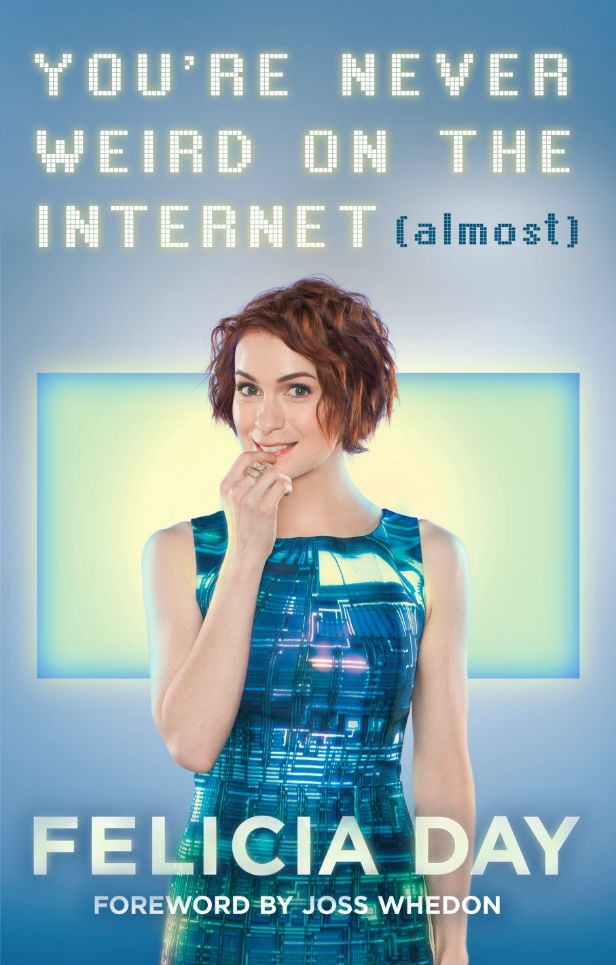 You also discuss how Hollywood wanted you to change yourself physically in order to succeed. Do you think that’s still a big pressure that’s placed on young actresses?
You also discuss how Hollywood wanted you to change yourself physically in order to succeed. Do you think that’s still a big pressure that’s placed on young actresses?
I think it’s number one. Even in my life now, no matter how much you accomplish as yourself there are always people who think you need to change in order to get further. Hollywood is a weird environment in that no one is really happy with where they are in the moment, they’re always looking for the next thing, and the idea of constantly morphing and changing, that something about you is holding you back is sort of the theme in the culture. It certainly was hard for me to adjust to, coming from a home schooled background that was very sheltered and college, where basically your achievement is proportionate to how hard you work. Fortunately or unfortunately, Hollywood is not that place. So it certainly took a lot of fortitude and ups and downs to get to the place where I decided to make my own thing because what I was in the moment wasn’t being accepted. And it’s not necessarily that I was a bad thing, it just didn’t fit the hole of what they wanted to see and what they’d seen success with in the past.
I once had a casting director tell me “Your insides don’t match your outsides.” Which was one of the most jarring criticisms I’d ever had but it kind of exemplifies what I felt in Hollywood, like I was probably confident in my weirdness and it didn’t match the way I looked on the outside and that’s why people didn’t really know what to do with me. Whether I was a character actor, whether I was a lead, I didn’t fit neatly into one of their moulds of what they’d categorised people as. And I think the emergence of digital culture is a reflection of the antiquated nature of how they see categories of people. I think the people who are most prominent online are the people who would not naturally succeed in the Hollywood system as we know it now and what I’m excited about now is that because the audience is telling the establishment that they want different things, it’s slowly but surely changing perceptions and that’s kind of a beautiful democratic thing I see happening, that success is forcing the establishment to change, that coming from the outside.
The sense of fan interaction is obviously very important to you as well, it must have been great to see people react to The Guild and see that there definitely was an audience for it.
Absolutely, when we uploaded that first episode and saw people respond to it, it sparked something in me that made me realise what I was searching for for so long, which was being a creator and enriching other people’s lives and making them laugh with what came out of my head. That’s really what drives me and the sense of community that built up around that show is something that’s unique to the web and something I love, and that’s why I keep doing what I do. Extending it to a company now and making all sorts of shows and still having our audience in mind all the time, to make them laugh and hopefully enrich them.
I mean, when I look back I don’t know how I actually did it. I don’t really know how I put up with it or thought it was a good idea! And I think it’s a testament to if you find meaning in life, if you focus on the things in life, that sense of meaning will drive you through the hardest, most challenging things because you don’t have a situation where you’re like “Oh, I just won’t do it.” The sense of meaning I got from the show and the people who made it with me and the audience who loved the show, that made me climb any mountain to get it done. So it wasn’t a question of giving up ever, it was just a question of how do we change it and how do we make it no matter what. That’s hopefully a message in the book, that it’s almost a homework assignment to find that in your life continuously, to make everything feel effortless, even if it requires a lot of effort.
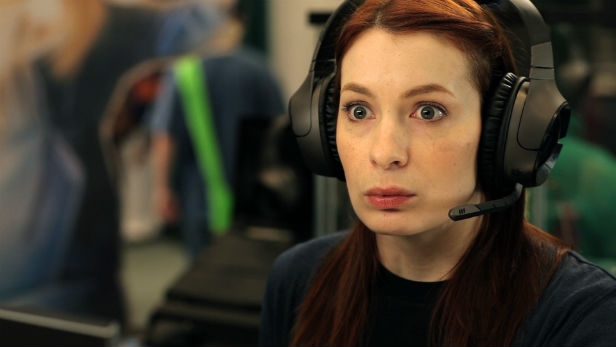
You’re obviously a convention veteran now, has the experience changed for you at all over the years?
It certainly can get overwhelming. I am surprisingly a very introverted person, it takes me days to recover from meeting hundreds and hundreds of people over a weekend, but I do my best to give as much as possible to each person because they’re important individually, and I think that’s what mass media tends to overlook. They look at numbers and they put a number on a person’s forehead, and being able to see them as a person, as somebody from Kansas who picked up a camera and made a webseries in their backyard with their family because of what we do, that is what art is supposed to be like. It’s supposed to affect people and connect with them, and I think when you think about people in huge numbers, you absolutely forget you’re affecting people face to face, so I think it’s the times when I’ve lost connection with that in my career when things got a little bit too big or overwhelming, that’s when I felt the most lost, because I didn’t know who I was connecting with as people.
I’m sure Comic-Con and the strength of that audience directly is related to the crazy number of superhero movies we have now. I was just at Vid Con, which is a YouTube audience convention, which is completely different from a Comic Con as far as demographic, but to see Hollywood slowly realising that 18 year olds, 15 year olds have 3 million people following them and love everything they do and treat them like they’re The Beatles, that’s going to totally inform the content that gets made in the next five years. Those stars are going to dictate a lot of what we get made because the audience give them their attention completely organically. I love the fact that that barrier is sort of being beaten down and that means we’re going to get more diverse voices that never would have been discovered from all sorts of walks of life, from all backgrounds, from all nations. I think it’s nothing but an awesome thing that will promote diversity and it’s all because the audience made it happen.
It’s certainly turned into a lot more big media dominated, especially Comic-Con San Diego. I love Comic-Con for certain reasons, but I also love those small conventions which are like 500 people in Maryland where you get to know each person over the weekend and sort of hang out with and sing karaoke with and meet them. That’s what the spirit of Comic-Con is and no matter how big it gets, hopefully that spirit is somehow retained underneath because it’s about people connecting over the joy of something that adds to their life.
The book doesn’t really touch on your acting work after a certain point, was there a reason why you decided not to focus on your time on Buffy or Supernatural?
Yeah, I think there are some amazing stories that I have from sets like that and I mean, personally I didn’t want to hang my book hat on, not exploiting, but in a sense using my famous friends’ names to sell books. There was a part of me that shirked away from that. But also the core of my story, other than Dr Horrible which I think was revolutionary in progressing digital content, all those amazing opportunities were sort of just part of the journey and I didn’t know if it was as universal a book. I really wanted this book, if someone had no idea who I am but was intererested enough in the cover and my face or something to pick it up, that they would be able to have an understanding of the culture, of geekdom and gaming that they never had before, and also see the journey of anybody who has any interests to be able to find themselves and accept who they are and create out of it. So there are a couple of reasons why I tailored those stories to be a little bit more agnostic as far as projects.
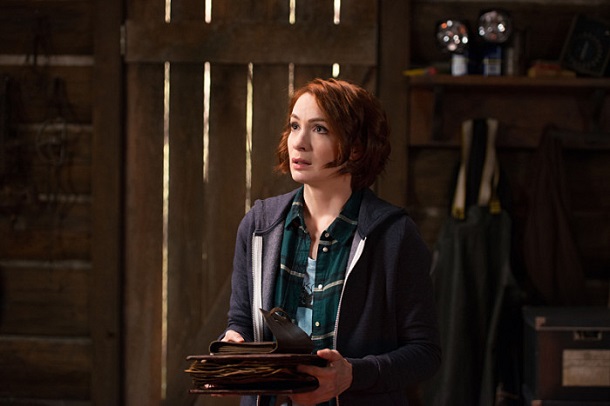
I’m not a gamer, but I definitely wasn’t lost or alienated during the gaming bits…
Yay! Thank you! That’s beautiful to hear!
I did want to ask about the chapter on GamerGate, which is very upsetting.
Yeah. I had actually already finished my draft when that happened, and I was doing rewriting, and it was a serious consideration whether I wanted to include it and give it a voice to be honest with you because I feel like hopefully it is something that is fading into the woodwork. But it was weird because I already had a chapter about negative comments so a lot of that chapter was already in the book about the video and a lot of negativity that I had experienced, and so it really thematically tied into the message of “There are always going to be people who make you feel like you’re other, and there’s always going to be bullying and hatefulness and it’s a lot easier for people on the internet to let those unhappinesses channel into hatred.”
And I think just the struggle of subculture to evolve and to change with different interests and divergent voices wanting to join in. And I just wanted to make it personal, this is my personal journey and if anybody’s encountering bullying or hatred, even if you’re a kid encountering that at school or somebody who is encountering something extreme like this, you’re not alone. I think that is a theme of the book, that you’re not alone in anything. You just have to know who you are in order to be able to connect with the right people, so my hope is that hopefully resonates with people and lends the message that don’t stifle yourself just because you’re ganged up on.
We do have to ask about some upcoming projects. How was it working with fellow Whedonverse-ees on Con Man?
Oh my gosh, well Alan [Tudyk] is somebody who I’ve only worked with randomly on Dollhouse, that we were in the same scenes ever but I’ve known him socially because that is the wonderful part of the Whedonverse, everyone is friends because Joss collects very awesome creative friendly people who create a family and he’s created a family amongst a lot of people and that’s just amazing to be a part of. So when Alan asked me to a be a part of it, I read it and I was like “Oh my god, this is going to be as big as Dr Horrible!” I’m so excited to be a part of this and support it in any way and to be in the first three episodes is really a joy. And just being on set, it made me feel like being on the set of Dr Horrible and the set of The Guild. Everyone’s just getting together to make something for the love of it and there’s no boss telling you to change your viewpoint because it doesn’t tick a box.
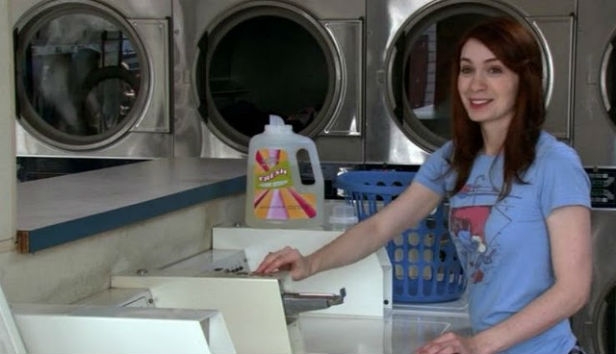
We also have to ask the obligatory Dr Horrible 2 question…
You know, it’s not really in my control, but of course I’m a fan of it so whether it gets made or not with me involved or doesn’t get made, I’ll always be a fan. I feel like it’s underappreciated in the scope of digital content but when people start looking back I’m sure it will have set a very early high that no one reached again for a long time.
And you’re the voice of Amelia Mintz in the Chew animated series!
Yeah, you know voice over is weird because you don’t really ever meet your other voice over people, so I’m very excited to be working with David Tennant even though I never will meet him, maybe! I’m a huge fan of the comic actually, John Layman the writer is a huge WOW fan, so he and I have been exchanging comics for years and when I heard that they were adapting it I was kind of secretly hoping to be involved somehow, and whether it was through him or the producers calling me up obviously I was so excited to be a part of it. It’s a really odd comic that I think animation fits perfectly and I’m excited to get it out there and hopefully they’ll make more!
Any other projects coming up?
I’m working with my company, we’re reevaluating a lot of things and there’s a lot of changes coming up that are very exciting, and bigger projects that are yet to be announced, and I’m personally working on a television show for myself, so that development is happening right now so we’ll see what happens. I’m very excited about it.
You’re Never Weird On The Internet (Almost) is out now from Sphere. You can buy it for £11.89 at Amazon.co.uk and read our review here. Keep up with the latest genre news with the new issue of SciFiNow.
